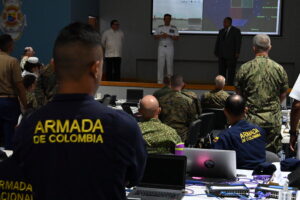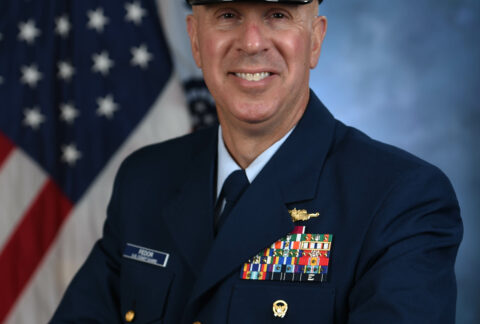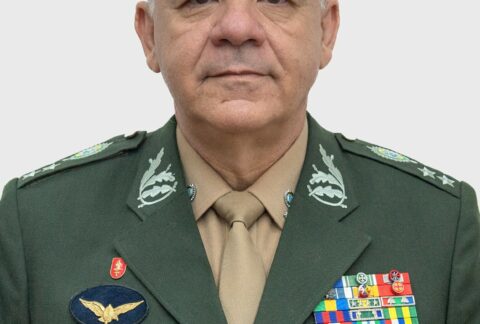The Colombian Navy hosted UNITAS LXIV, the world’s longest-running multinational maritime exercise, in Cartagena, July 11-21, 2023.
Twenty-six warships, three submarines, 25 aircraft (fixed wing and helicopters) and some 7,000 participants from 20 partner nations were present to conduct joint maritime training operations to enhance tactical proficiency and increase interoperability.
The Colombian Navy is also celebrating a historic milestone: its 200 years of existence.
Admiral Francisco Hernando Cubides Granados, commander of the Colombian Navy, spoke with Diálogo about the importance of UNITAS and new developments in the exercise.
Diálogo: What is the importance for the Colombian Navy of hosting the UNITAS Multinational Exercise?
Admiral Francisco Hernando Cubides Granados, commander of the Colombian Navy: UNITAS is the multinational naval operation that takes place annually and makes it possible to test the degrees of interoperability of all participating units, so as to optimize the capabilities of each one of them to efficiently counter threats of an asymmetrical order or regular warfare in the hemisphere. Being the host means a lot, since it is under this designation that we carry out all the organization, planning meeting leadership, and execution of the exercise to allow the Colombian Navy to strengthen its knowledge and operational capabilities to lead a multinational force in a crisis situation.
This year also has a special connotation, since the Colombian Navy commemorates the 200th anniversary of the victory of our greatest naval hero, the great Admiral José Padilla López and his brave sailors in the decisive battle of Lake Maracaibo, a triumph that represented the consolidation of the independence of all of Spanish America. Therefore, in the midst of such a historic celebration, it was an honor for Colombia to host the 64th version of multinational exercise UNITAS.
Cartagena de Indias was honored to have received the noble and hardy sailors from 20 countries, the crews of 23 ships, as well as the crews of 29 aircraft, and the members of special forces units, demining groups, divers, and marines. We also had the privilege of hosting SOLIDAREX 2023, in its third version, but the first in the Caribbean. In fact, I was able to witness in Coveñas the different humanitarian assistance exercises, seeing the capabilities and efficiency of a Multinational Task Force composed of the eight countries [that participated] with their 12 ships, naval air units, diving, search and rescue groups, for a total of 2,275 crew members; constituting the version with the largest number of participants, ready to act in a coordinated manner as a first response to natural disasters of great magnitude in the hemisphere.

Diálogo: Colombia hosted UNITAS in 2002, 2005, 2013, and 2018. What are the lessons learned in planning Multinational Task Force-level exercises?
Adm. Cubides: Every operation is different, even though we do typical exercises, technological advances and different threats are changing and therefore we must adapt. In planning UNITAS 2023, we had to think about how to conduct relevant exercises with unmanned vehicles, hybrid threat defense, as well as cyberdefense, and cybersecurity. During the planning we also thought about including expert conferences on coast guards, for example, so that expert personnel could share their knowledge and experience.
Diálogo: UNITAS brings together naval units from Latin America and the Caribbean, both warships and submarines. What is the fundamental purpose of this naval exchange?
Adm. Cubides: The UNITAS exercise represents an opportunity to strengthen interoperability among the different forces that participate, as well as an unparalleled occasion to build trust among the military forces of the Americas, identifying common challenges to hemispheric security and working together to confront transnational threats.
UNITAS provides an opportunity for our countries’ naval forces to train in a variety of scenarios and enhance their ability to operate as a single multinational force. The intense training focuses on strengthening coalitions and maritime security cooperation, as well as deepening mutual understanding, professional ties, and friendship.
Diálogo: Colombia is the only Latin American nation that has participated uninterruptedly since 1959 in all the editions of UNITAS. What is the reason for this interest?
Adm. Cubides: After 200 years of history and naval power, the Colombian Navy maintains its commitment to regional security, building peace, and promoting the development of the Americas, especially as a pivotal nation near the Panama Canal, a strategic geographic point for the world economy. Therefore, we will make our best efforts to continue to strengthen cooperation to face common threats in the maritime environment, increasing interoperability under the highest military naval standards, and our uninterrupted participation in UNITAS is proof of this. In this way, we are always ready and willing to counter threats such as drug trafficking; illegal, unreported, and unregulated fishing; human trafficking; illegal migration; and climate change.
Diálogo: UNITAS is promoted by U.S. Southern Command (SOUTHCOM). Why is it important for Colombia to work with SOUTHCOM in the oldest naval exercise in the world?
Adm. Cubides: I believe that Colombia must work hand in hand with our most valuable allies to maintain peace and democratic values in the hemisphere. SOUTHCOM maintains the same commitment, and therefore it is the duty and the work of the Colombian Navy to strengthen ties of cooperation, especially around the planning and continued execution of a multinational exercise as relevant as UNITAS.
Diálogo: What’s new about UNITAS in its 64th iteration?
Adm. Cubides: This exercise has evolved year after year, broadening its training objectives, going from strictly naval maneuvers to other fields, including amphibious, river, Special Forces, diving, and mine-clearing exercises. In fact, this 64th version is considered the most complete in the history of UNITAS, since we have different specialties available, allowing us to carry out naval, air, and expeditionary operations and to strengthen humanitarian assistance and disaster response. Together, we will conduct more than 80 exercises in the maritime, river, air, land, and cyber domains.
For the first time in the history of UNITAS, the inclusion of a cyber operations exercise (cyber defense, cyber security, and cyber intelligence) was proposed and approved by the various countries in attendance. In a changing and advancing world, attacks in cyberspace have become more frequent, seeking to affect command and control or critical infrastructure, to generate chaos or access classified information. This exercise was conducted by the Colombian Navy, headed by the Naval Intelligence Headquarters with its Cybernetics Command, in two phases, the first for decision making under threats of cybernetic nature and the second with a technical component where specialists from different countries developed a scenario of attack and defense of a ship in a simulated cyberspace environment. The aim of this exercise is to armor naval operations in cyberspace and to exchange experiences and best practices in this domain for which there is not yet a fully defined standard.
Diálogo: How has UNITAS strengthened naval operations among partner nations to counter threats at sea, especially in the fight against drug trafficking?
Adm. Cubides: The interoperability and multilateral relations that are strengthened in UNITAS have been extended to the fight against drug trafficking. One of the initiatives that was born from that interoperability was the Orión Naval Campaign against Drug Trafficking, of which Colombia has been a leader since its 2018 inception. In the present, 2023, we just closed version XI, with more than 1,000 tons of narcotics seized since the first campaign, among 40 countries, 101 institutions, and six multilateral organizations participating. We are even making all the necessary arrangements to include countries in the Indo-Pacific area of influence. In this way, the Americas are becoming the axis of leadership against drug trafficking and other transnational threats.









